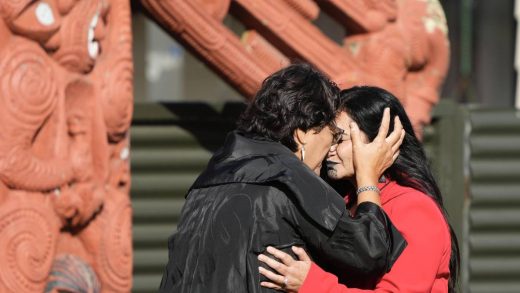
ROCK
St. Vincent
All Born Screaming (Virgin)
As St. Vincent, Annie Clark has been a Bowie-esque, shapeshifting performance artist for most of the past decade, creating sonic and visual personas for every album, every tour and every video clip. All Born Screaming is her first album since she went ’70s-inspired retro-glam for 2021’s Daddy’s Home, and it’s almost a complete departure from that project.

To start, it marks the first time Clark has self-produced and, second, she hasn’t overtly assumed an obvious visual character or identity. She has said she was consumed by the intensity of the musical palette she was creating, which ranges from the gentle dub reggae of So Many Planets to the crooning, James-Bond-theme vibe of Violent Times and the pummelling art rock of the albums first two singles — Broken Man and Flea.
Clark says she began the sonic process by jamming with herself — linking three analog synthesizers and a pair of drum machines — then shaped and moulded the sounds and parts she liked into a song cycle which reflects the journey implied by the album’s title.
Album opener Hell is Near kicks things off with a nearly hymnal vocal line, a simple beat and orchestral synths, a sonic prelude to the depths plumbed in the next few songs. Reckless is a slow piano-based ballad (or, as much of a ballad as Clark does), which morphs into a noisy, industrial crescendo before she invokes images of struggle and defeat with Broken Man, a funky, minimalist electro-beat track that moves through three distinct phases before reaching its noisy conclusion.
Flea suggests the cancer that can be outside influences (Dave Grohl plays drums in its final movement), and the record reaches its thematic nadir on the Vogue-ish (and eminently danceable) Big Time Nothing, Violent Times and The Power’s Out before it swims back to the light, to redemption and to love on Sweetest Fruit, So Many Planets and the uplifting title track. ★★★★out of five
Stream: Broken Man; Big Time Nothing; Violent Times
([embedded content]
— John Kendle
POP
Sia
Reasonable Woman (Monkey Puzzle)
A whole album of Sia singing alone is great, but Sia paired with the icon Chaka Khan? Fire. Their new duet Immortal Queen is everything you would want in a combo of Sia and Khan — duelling soaring voices, preening egos and insane lyrics about time travel and robot servants.

Immortal Queen is just one of the highlights of the super 15-track Reasonable Woman, Sia’s first solo album since 2016 following her work on the movie Sing, a Christmas album, her writing for others such as David Guetta and Pink, and the supergroup album LSD.
Sia hasn’t lost a step, apparently able to write three bangers before breakfast. The new album is packed with the Australian’s trademark mix of tropical pop, hip-hop, house and a hint of ska, combed with her distinctive, sky-high voice and ear for the bombastic.
It also contains her songwriter’s ability to switch from hurt and broken (I Forgive You) to ecstatic lover (Towards the Sun) to vengeful, hell-releasing angel, such as on I Had a Heart.
But on this outing, the ever-masked, forever catchy Sia is most interesting with others. In addition to the Khan duet, the best songs are Dance Alone with Kylie Minogue, Incredible with Labrinth and Fame Won’t Love You with Paris Hilton.
It’s not unreasonable to say Reasonable Woman is the sound of a comfortable Sia rarely shifting out of third gear, but note: her third gear is way higher than most artists ever dream about. ★★★★1/2 out of five
Stream: One Night; Immortal Queen; Dance Alone
[embedded content]
— Mark Kennedy, The Associated Press
JAZZ
James Brandon Lewis Quartet
Transfiguration (Intakt)
James Brandon Lewis is firmly set on the list of top contemporary jazz saxophonists. Universally impressive album reviews, the cover of Down Beat and praise from jazz insiders confirm it totally. This album does nothing to suggest the praise is not deserved. Transfiguration is the fourth album with his quartet featuring Anuan Ortis on piano, Brad Jones on bass and Chad Taylor on drums. It is another winner.

There are several words that come to mind about this music. “Confident” and “serious” are two of them. Serious does not mean gloomy or melancholic; it has an intensity and movement that seem to be perfect for the mood and the input of Lewis’s colleagues.
Lewis knows what he wants to communicate at every turn, and that impacts the listener completely.
The compositions are detailed with shifting and unexpected meters and tempos. Swerve, for example, has a complex, bluesy feel with a driving beat. The Trinity of Creative Self has a beautiful intro with piano and arco bass that sets up a ballad while maintaining melody shifts into introspective examinations from all members.
Per 6 has an Eastern flavour with a repeated saxophone riff anchoring the rhythmic underpinnings. Energy and harmonic diversity are benchmarks throughout. Pianist Ortis’s solo and the work of drummer Taylor are stellar. Élan Vital is a reference to French philosopher Henri Bergson, and has a powerful full-on mood with a peaceful fade at the end. Triptych is perhaps the track that most clearly displays the complete synchronicity in the quartet. Swirling through melodic changes and mood swings non-stop, they nail each moment with the confidence mentioned earlier.
The whole album shows the unity of purpose and mood that all have brought to the table. Jazz dead? Not when it’s in the hands of musicians like James Brandon Lewis. ★★★★1/2 out of five
Stream: Empirical Perception; Trinity Of Creative Self
— Keith Black
CLASSICAL
Grieg: Holberg Suite, Ballade & Lyric Pieces
Andrey Gugnin (Hyperion)
Russian-born pianist Andre Gugnin performs an all-Grieg recital in this release by Hyperion, the label’s Record of the Month for May.

The artist immediately shows off his expressive artistry in the original version of the Holberg Suite, Op. 40, penned in 1884 and later arranged by the Norwegian composer for string orchestra. Highlights include its lilting third movement, Gavotte, or fifth, Rigaudon, teeming with rhythmic vitality.
Another noteworthy offering is Ballade in G minor, Op. 24, a set of 14 variations based on a Norwegian melody, written after the death of Grieg’s parents in 1875. Gugnin sensitively renders its sombre, 16-bar opening theme before colouring it with an eclectic range of styles and moods, with the ninth variation its most elaborate.
Also featured are two sets of Lyric Pieces, with the full collection composed of a total 10 volumes of tone poems on par with Schubert’s Moments musicaux, or Mendelssohn’s Lieder ohne Worte, showcasing the composer’s skills as a miniaturist.
The pianist brings lightness to the first of the sets, Book 3’s (Op. 43) titled Frühlingslieder (Spring songs), beginning with its fluttering opening movement, Butterfly, and capped by its lyrical ode to the season, To Spring. He also instils levity into Book 7 (Op. 62), beginning with waltz Sylph before bringing listeners full circle with the aptly titled finale Homeward.
The album serves as a welcome addition to the Grieg discography. ★★★★ out of five
Stream this/these: Any movement from the Holberg Suite, Op. 40; Lyric Pieces, Op. 43; No. 1. Butterfly; Little Bird
— Holly Harris


